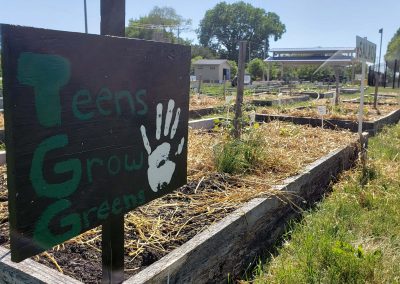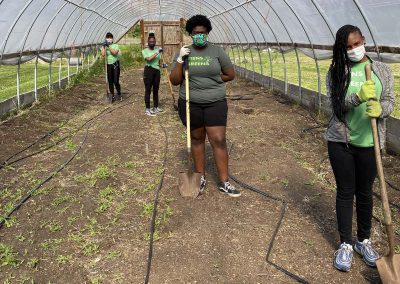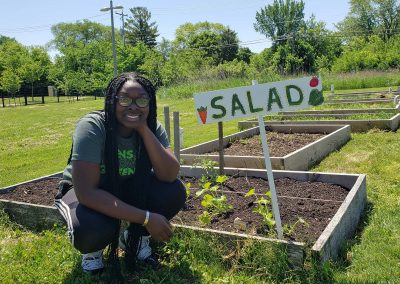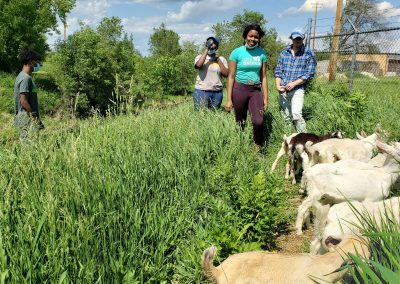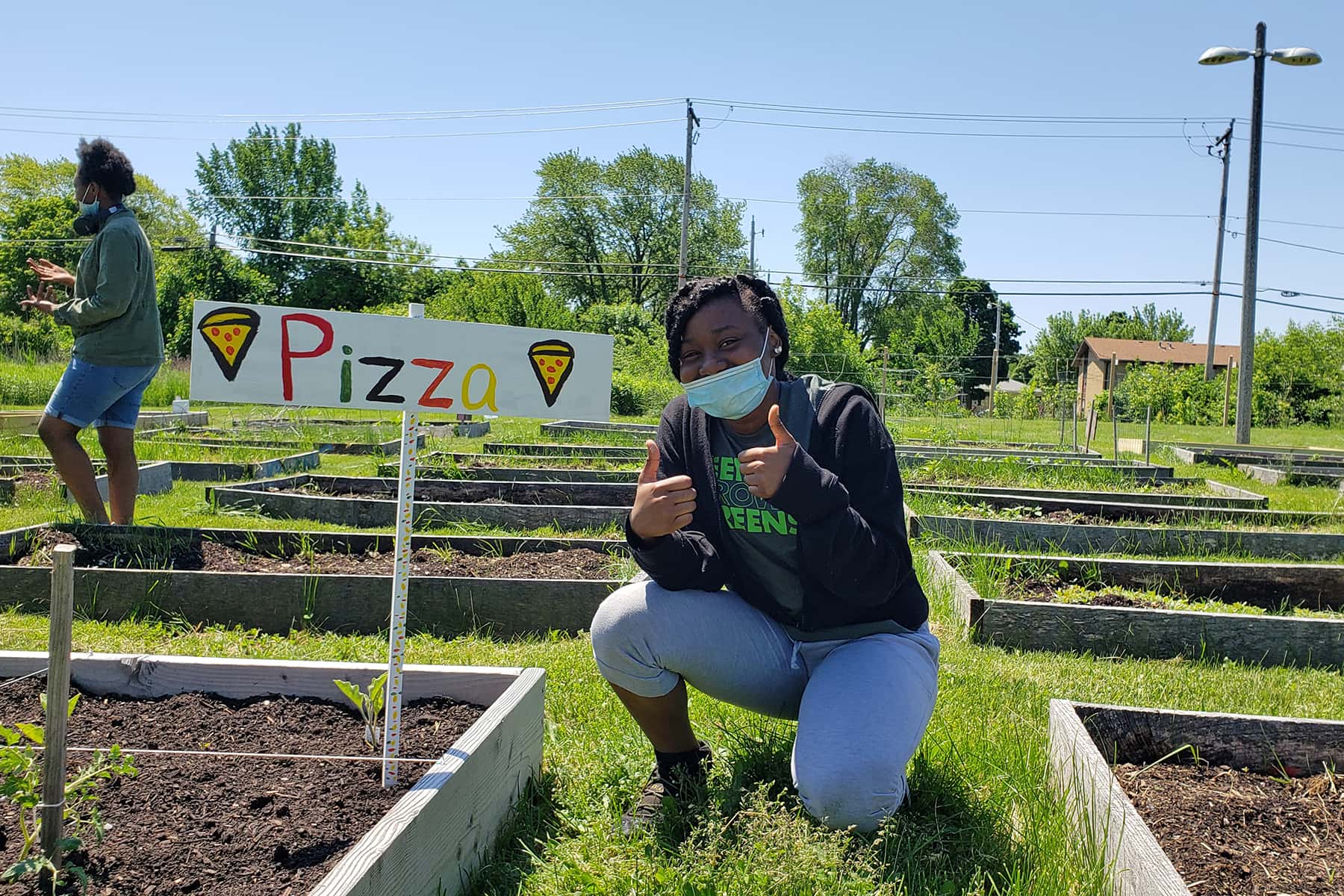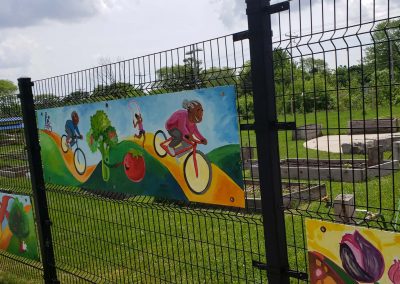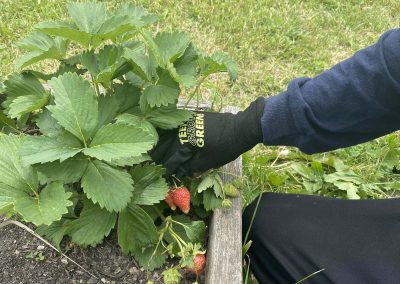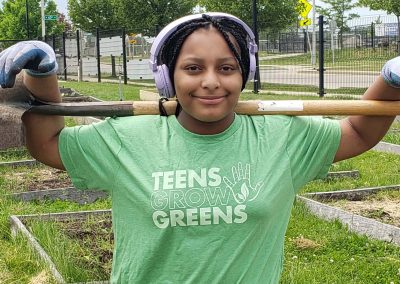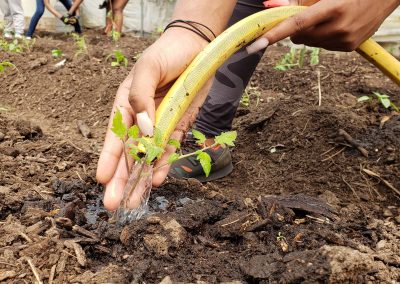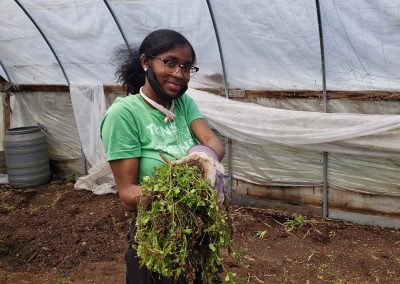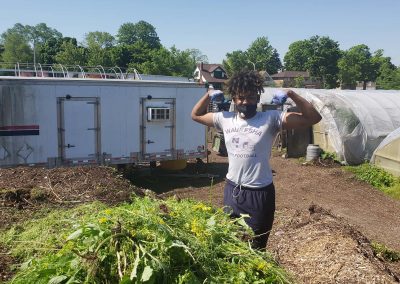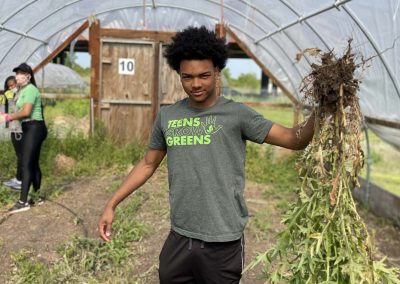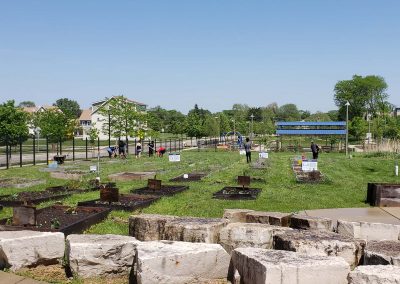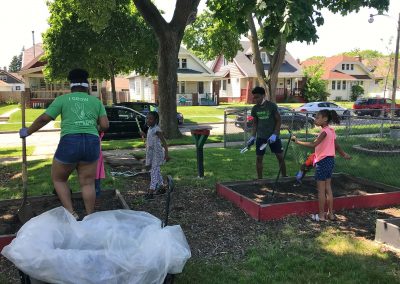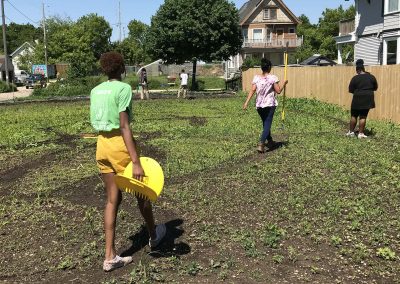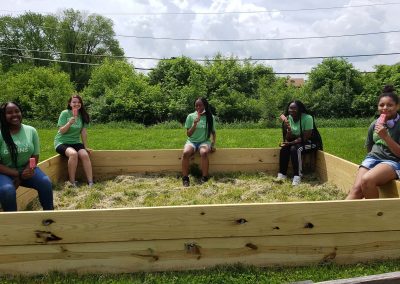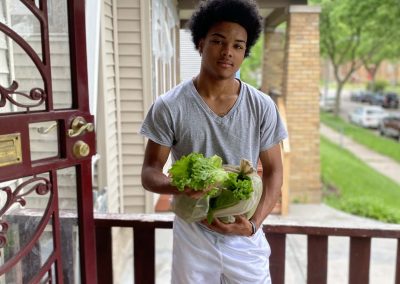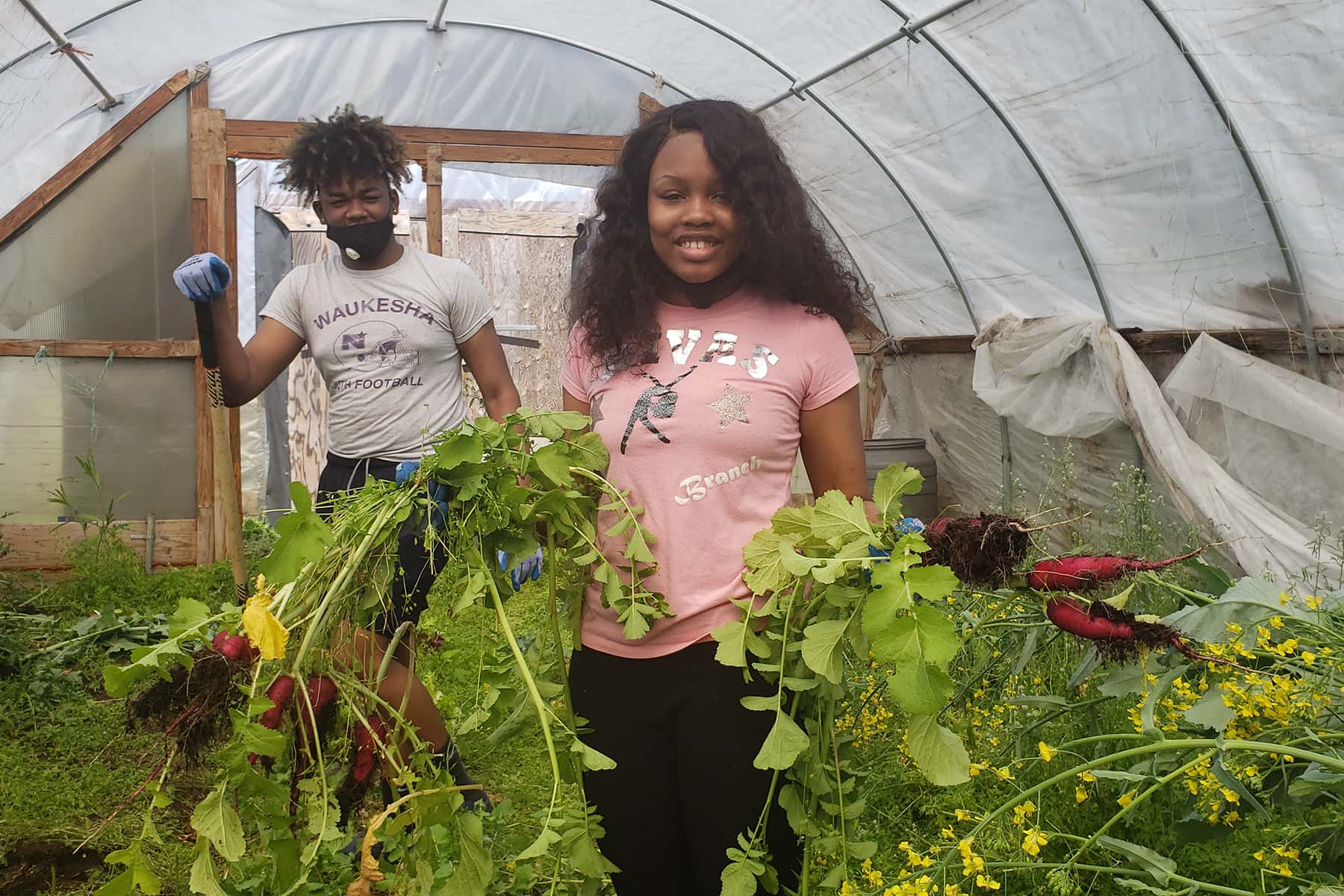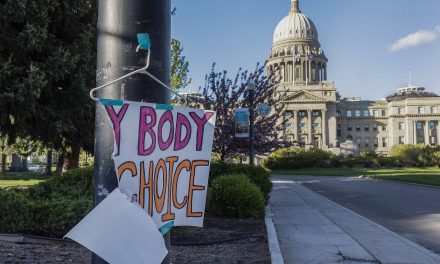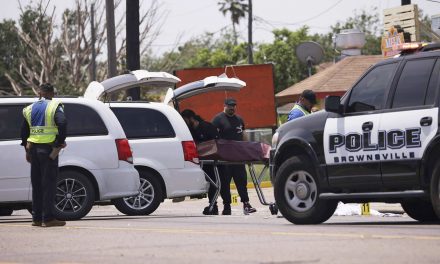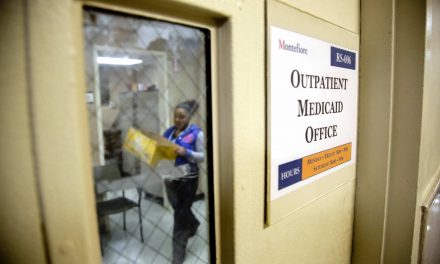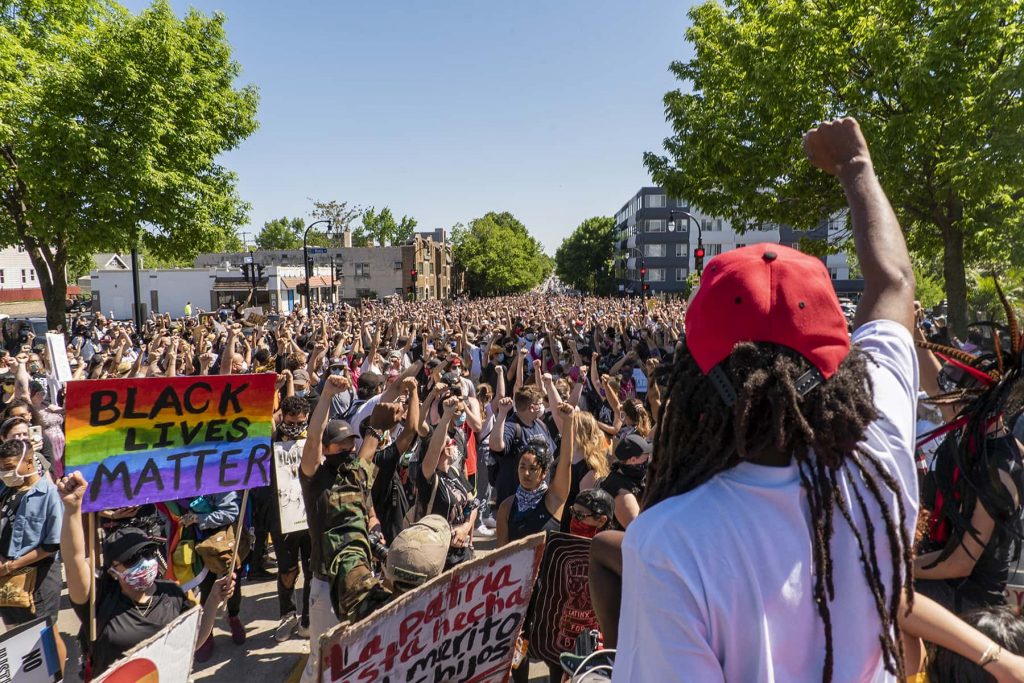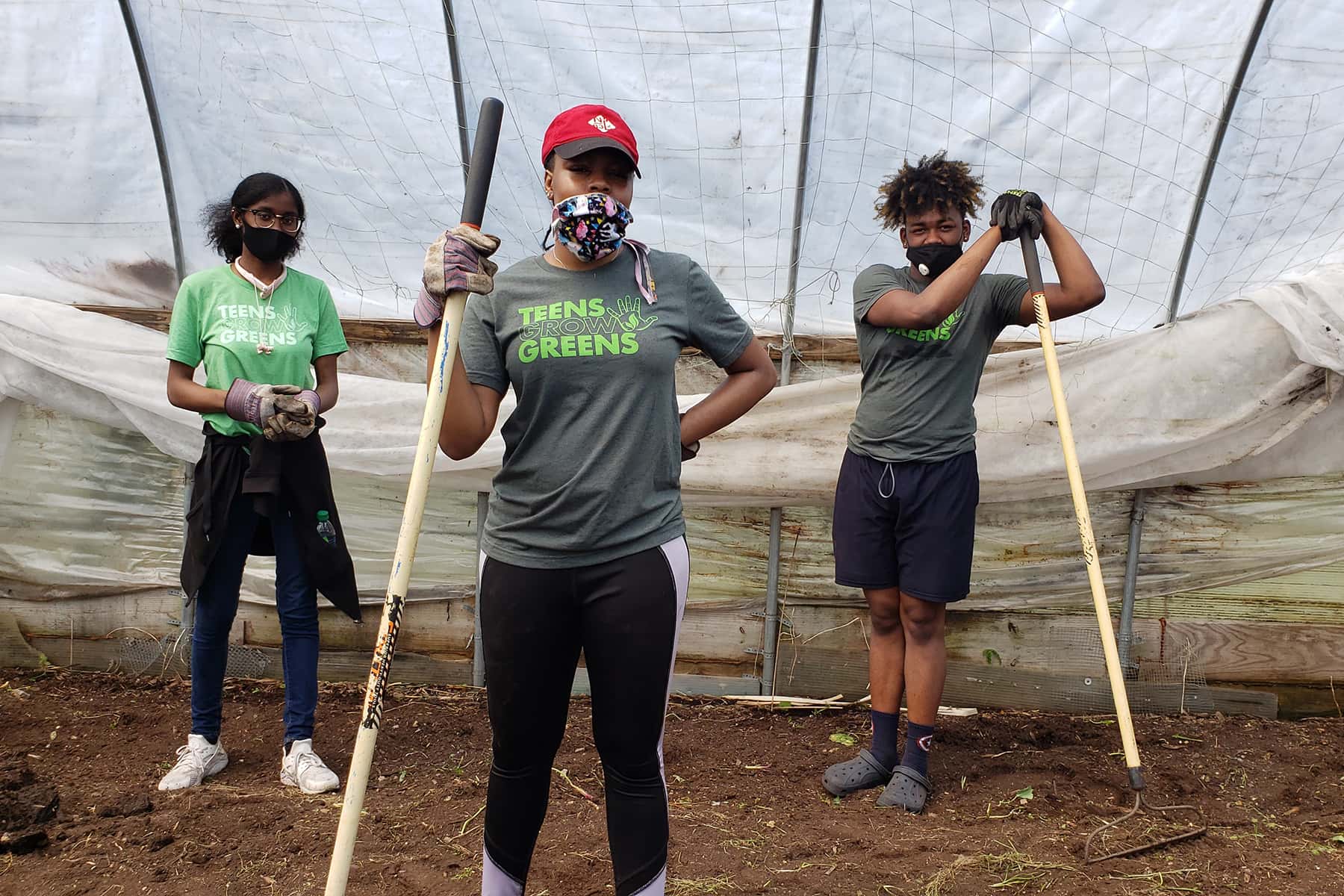
Since 2013, the Milwaukee non-profit Teens Grow Greens has, as their motto attests, “grown more than plants.” It has consistently grown and nurtured the bodies, minds and spirits of Milwaukee youth, predominantly Black and Brown teens but also Asian American and white youth. Based on principles of respect, responsibility and resilience, the nine-month paid internship helps high school students develop healthy habits, cooking skills and gardening know-how, vulnerability and leadership, financial literacy and entrepreneurship opportunities. Now, as much as ever, when systems continue to declare war on Black and Brown bodies, the nurturing of those bodies is so important. Teens Grow Greens declares, with every lesson and hands-on experience, that Black and Brown Lives Matter, too. Even more so, the Teens’ commitment to learning and serving speaks loudly about how their lives and their futures matter.
As a non-Black ally, I’ve been marching for the Black Lives Matter movement, and will continue to do so because, as Martin Luther King Jr. says, “the ultimate measure of a man is not where he stands in moments of comfort and convenience, but where he stands at times of challenge and controversy.” It is important for me to join these marches that declare the anguish and anger of my Black brothers and sisters–and to let them know that I see them and hear their voices.
But in addition to my occasional on the streets, one of the things I am fortunate to do every day is work with Teens Grow Greens as it declares that our almost fifty interns and apprentices (mostly former interns who are rehired) deserve the right to create healthy lives for themselves and their families, deserve the right to educate themselves and their peers, deserve the right to lead themselves and younger children in the community, deserve the right to become financially literate and financially independent. They deserve, above all, the right to demand that their bodies, minds and spirits matter.
In a recent declaration, the Board and staff of Teens Grow Greens described that Teens Grow Greens “was created in response to the unfair realities afflicting many youth of color in Milwaukee, providing experiences, opportunity and access to resources that might not otherwise be available. Everyone deserves the right to belong, grow and live a life of purpose. It is the vision we have for every Teen at Teens Grow Greens.”
These rights are one reason, I believe, that we always capitalize the word “Teen” (and, in the summer when they mentor children, “Kid”). The elevation of the letter “t” to “T” not only emphasizes the word but also declares the Teens’ importance in a world where they are not always valued and, especially for Black and Brown Teens, where too many systems declare that their lives don’t matter.
When I published my first 2020 column about Teens Grow Greens, I hadn’t yet begun working as the Education Director. However, I declared then that “the kids are (all) right,” that the Teens we had hired as this year’s interns (all but one are Black or Brown) were strong, confident, caring, and compassionate–and that they would continue to grow in these attributes throughout the year. Now, five months, a novel coronavirus, and continued police brutality later, I am happy to report that they most certainly have grown, even as I fear for their Black and Brown lives every day.
PLANTS AND TEENS BOTH NEED RESILIENCE
I have always been fascinated by those time lapse videos of seeds germinating in the ground, water first filling the seed, roots emerging to anchor and nourish the tiny seedling that starts pushing a shoot up through the soil toward the sun, where it must hope for the best conditions for growth and also fend for itself against weather, wildlife, humans and other dangers. For those seeds that grow, survive and thrive, I can’t think of a better word to describe them than “resilience.”
In addition to straight resilience and “hoping for the best,” though, part of the equation is nourishment: the best pH for the soil, the best nutrients, the best combination of sun and water. Part of the equation, the Teens and I have learned, can be support from surrounding vegetation that gives a plant nutrients or shade or camouflage from predators, especially in the wild. When humans grow plants, we want to be the ones to provide this nourishment and support; otherwise, our plants will dry up in the sun, to borrow a phrase from Langston Hughes.
So, too, Teens. It’s one thing to expect Teens to be resilient, to take what looks like a daunting task (such as pushing oneself up through soil or navigating high school). It’s one thing to let them live and learn, fail and pick themselves up again–even to teach them skills to help them through difficult situations. But it’s another thing to ask them to be resilient when they live in a society where people and systems believe that their bodies, minds, and spirits aren’t worth nourishing or supporting. When they see week after week another white body pressed on the neck of a Black or Brown body or shot to death unarmed. Without really ever stating it, Teens Grow Greens has always sought to be an organization that counters such narratives by nourishing and supporting its Teens with dignity, trust, love and opportunities for growth.
The Teens’ growth began in February. While Teens Grow Greens was forced to suspend face-to-face operations only a month and a half into the internship, it quickly pivoted in mid-March to online learning, with lessons and projects about healthy living becoming mainly independent studies. This, all while Teens were trying to figure out how to conduct all their regular school learning online, too. Despite the strange and difficult (and isolated) learning curve, the Teens express that after three months of studying and practicing healthy living they have grown in their understanding of and care for their bodies, minds and spirits. I applauded their resilience in almost every email and in every online chat.
Lessons included studying food nutrition labels, learning how to germinate seeds and researching how to create a healthy meal for four for under $25. Videos about the life of plants, mindfulness techniques, health care and immigration and more helped make the learning about their bodies, minds and spirits engaging, as did online chats with Black business owners like Manaan Sabir of Shindig Coffee and Angela Mallet of HoneyBee Sage Wellness & Apothecary at the Sherman Phoenix. Intern Khamari Weston, a rising sophomore at Milwaukee School of Languages, says, “As a Black person, [this] is very uplifting… Their stories are very inspirational and they have a lot of wisdom. They open our eyes to new ways to look at life.” Other guests included Christie Melby-Gibbons of Tricklebee Cafe and permaculturalist Barbara Richards, who taught the Teens about letting plants grow naturally in a supportive ecosystem.
When we sent seeds home with the Teens to germinate in wet paper towel folded into a plastic bag and taped to a sunny window, a number of them came to us a few weeks later and said that nothing had happened. The seeds hadn’t had the right conditions. So they asked for new seeds (and some had had the forethought to keep some in reserve) and tried again. This resilient attitude contributed, I think, to their learning not only about plant life but their lives.
Was the adapted online learning successful? The Teens report “Yes.”
After surveying the Teens recently, 96% say they better understand the plant life cycle and 83% say they better understand how to grow plants.
78% better understand how food affects their body, with similar percentages saying they now read food labels, know how to adapt family food traditions to make them healthier and better understand how systemic racism has affected food systems in this country.
87% better understand what foods help boost mental health and 83% better understand the benefits of mindfulness practices. And even better, 100% of the Teens are striving to eat healthier and trying to maintain the healthy living goals they set for themselves in May.
These statistics are important and hopeful, especially for Black and Brown Americans who are at higher risk of having diabetes, heart disease and asthma, as well as at higher risk of being immunocompromised and therefore more susceptible to the coronavirus. Even though the Teens have just scratched the surface about the connections between their bodies, minds and spirits, they can now begin to dig deeper for more knowledge and more strategies for improving their and their families’ lives.
Shawnkia Casey-Baldwin, an intern and rising senior at Riverside University High School, talks about the hard work of self-improvement but offers helpful advice: “If you are willing to focus and push yourself, you will grow. Just be easy on yourself: you’re doing just fine. I am always pushing myself to grow and be a better person than the one I was yesterday, but I will also always sit and give gratitude to myself because self-love is the best love.” I told Shawnkia and the rest of the Teens many times that once we had to temporarily suspend normal operations and work online, I wouldn’t have been surprised if some of them decided to quit. But most didn’t. Instead, they demonstrated resilience by working independently to find ways to love themselves and each other–bodies, minds and spirits–even from a distance.
PLANTS AND TEENS BOTH NEED NURTURING SPACES TO GROW
A typical summer for Teens Grow Greens would see Teens congregating during the week in Fred’s Garden on 24th & Finn, mentoring young children from the neighborhood. Each Teen would be paired with a child and would design activities and lessons about character traits such as curiosity, self-control and grit. They would receive in-person cooking lessons and prepare their lunches together. And they would work in the garden to plant, weed and harvest food. Every week, the Teens would have attended a field trip exploring Milwaukee and Wisconsin, then every Saturday, they would have chaperoned their kid mentees on a character trait-related field trip. Teens would co-create the learning and growing environment for themselves and their mentees, learning vital lessons in leadership.
Of course, COVID-19 has changed all that: no large gatherings in Fred’s Garden, no large cooking lessons or sharing meals together, certainly no field trips. The Teens were dismayed, of course. But Teens Grow Greens pivoted once again to create new spaces for the Teens to thrive. Now, Teens are assigned in small groups of about five to one of ten community gardens throughout the city, where they are volunteering, with face masks, twice a week to assist the garden managers with growing and garden projects as well as grow their own plots of vegetables, which they will eventually take home to their families and donate to local food pantries. I suspect that by the end of the summer, we will have distributed at least one ton of food to them and the community.
One group of students, for instance, is helping to restore the Marcus M. Garvey Garden in Sherman Park, planting eight raised beds, and designing signage to celebrate the Jamaican-born Black nationalist and leader of the Pan-Africanism movement.
Another is assisting Walnut Way Conservation Corp. in their garden and orchard. Angela Kingsawan, the Urban Agricultural Coordinator, reported after only the first week that the Teens were “respectful, enthusiastic and hardworking” and that she “appreciate[d] the chance to learn and grow by engaging with community youth.”
On the south side of Milwaukee, another group of teens has already redesigned a well at the KRIC Community Garden on 5th & Arthur with new wood chips and plants, arranging the mulch into a peace sign and, at the Harrison Park Garden on 14th & Harrison, they are discussing the KK River Plaza and re-naturalization project with garden manager Stephanie Mercado of the Sixteenth Street Community Health Center.
The Teens that I work with at the Ultimate Collaborative Farm (formerly Growing Power) have planted their own hoop house, learned how to transplant and tumble compost and even grazed baby goats along Lincoln Creek as it winds into Havenwoods State Park. And the other Teens I work with at nearby Westlawn Gardens have planted and painted signs for eight beds designed to feature recipe ingredients for salads, salsas, burgers, and pizzas. They will be creating a recipe book for Westlawn residents and inviting them to reap the beds’ bounty. They are also creating a proposal for an end-of-summer celebration replete with music, food trucks, sample offerings from all ten of our Teens Grow Greens garden ventures, and, of course, appropriate social distancing.
Other gardens include the community Bumblebee Garden on a Mitchell Street corner and two enormous hoop houses at Maglio Farms on Port Washington Road. Teens Grow Greens also helps maintain the prolific raised beds at Moody Park.
In addition to the outdoor work, Teens are working in groups to create an online video series for children that replicates what they would have been doing in person, thereby maintaining their intended commitment to serving their younger peers. They have dubbed the series, which will appear on the Teens Grow Greens website weekly beginning the end of June, “Straight Outta the Garden,” a nod to and positive adaptation of the 2015 film Straight Outta Compton. The idea is that the fruits of their labor and ideas will go straight to their families and the communities that the gardens serve.
Finally, equipped with new cooking utensils, herb pots from Teens Grow Greens’ Webers Greenhouse and ingredients delivered to their homes by staff, Teens will still benefit–online, of course–from bi-weekly culinary lessons by Lisa Kingery of FoodRight Inc., learning how to cook healthy, plant-based meals for their families.
While the summer has only just begun, the Teens are well on their way to realizing even more the power of their bodies, minds and spirits and their potential to create positive change in their community.
PLANTS AND TEENS BOTH NEED A WORLD THAT VALUES THEM
I have intentionally used the word “declare” many times throughout. Those who believe that Black Lives Matter are making declarations for justice. Those who keep saying that “all lives matter” are making ignorant counter-declarations. And Teens Grow Greens is declaring, though its mission and steadfast work with Black and Brown youth, that it sides with the former.
The word “protest” comes from two words: pro- (“forward) and -test (“declare,” as in “testify”). In its own way, Teens Grow Greens is protesting and condemning and counteracting the forces that continue to tear down youth, particularly Black and Brown youth. As intern Jason Tyson Jr., a rising sophomore at Riverside University High School, says, “I learned that when you dig weeds out, you [have] to get the roots. Just pulling them out isn’t enough.”
No offense to weeds (I’ve been learning that not all weeds are noxious), but together, let us all “get the roots” of the systemically racist weeds that continue to rear their ugly heads in our country’s garden.
© Photo
Dominic Inouye

